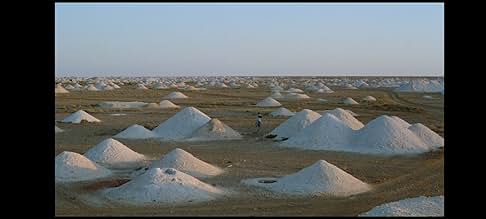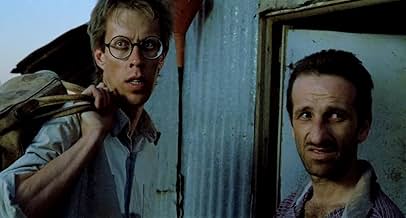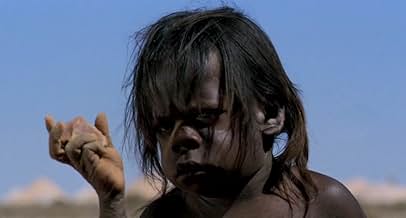IMDb रेटिंग
6.9/10
2.8 हज़ार
आपकी रेटिंग
अपनी भाषा में प्लॉट जोड़ेंA geologist employed by an Australian mining company finds himself disputing the rights of some aborigines who believe their land to be sacred.A geologist employed by an Australian mining company finds himself disputing the rights of some aborigines who believe their land to be sacred.A geologist employed by an Australian mining company finds himself disputing the rights of some aborigines who believe their land to be sacred.
- पुरस्कार
- 2 जीत और कुल 2 नामांकन
फ़ीचर्ड समीक्षाएं
I really liked this movie. I liked the respect that was offered and given by both the native demonstrators and the geologist. This film prompted thought, thought about what is valued when death approaches, whether that is seen as death of an individual or a people. The mining company stands on the foundation of its legal right to proceed with what the contemporary civilization values, and some scoff the values of the natives. But if we listen we hear that is something we all must address when asking of ourselves what is sacred and will we protect and defend that in the face of our own extinction, because clearly the law is not designed to protect the sacred, but to settle a dispute. We are an amalgam of the characters, the native voice that seeks self perpetuation of tribe and story, the company voice that works for progress and acquisition of wealth, the mediator and thinker voice that comes through the geologist, and the law which strives of order in chaos. These tensions of the human condition, are made so vivid in the land and skies of the Australian outback.
Herzog is a simple man, easy to read. Hearing him talk of his films, one gets bored easily.
His films are simply conceived, like Lynch's, but once he gets rolling, his intuitions take him to strange, exotic corners of the soul. There he leaves traces that last. I love the man's work, much of it. I love the fact that he really seems to be driven by urges that seem to accidentally result in something that can cross the distribution divide to reach me. This is no small feat; the films I watch that have ideas and matter are what maybe a millionth, a billionth? of the similarly deep insights and artifacts that would have similar effect in me, but which cannot cross that divide.
When I watch his work, some of which I reserve for the future, it is a dip into the film of Herzog. Failures add to this. Risks that did not pan out for him, do for me.
This film has some heavy disadvantages. He is in Australia and he simply does not understand that to photograph the land the way it affects its inhabitants, you have to photograph nothing. Nothing is what matters. But he gives us a tornado. Its beautiful and violent it even fits the story. He gives us unrelenting piles of boring waste. This too is effective in the film, but not of the place.
He misses both the place and he people. He does give us beautiful Aboriginal faces. He does celebrate them. But its from a deeply disturbing patriarchal, colonial perspective. There is some of this in his Peruvian adventures, but it is hidden in his respect for the Jungle. The natives are simply part of the terrain. He cannot do that here. This also suffers in that he felt it necessary to have an on-screen observer who "learns" the value of the place and turns from heading the mining effort to living with the people.
The result is that the film is overt in its sentiments, but everything works against its honesty. We are left with having to accept it locally, each scene as a sort of standalone taste: black patient faces staring out of pilot seats in an airplane given to them; a man on a witness stand testifying in a language no other soul on the planet understands; an old biddy waiting in the sun at a mine opening on the of chance that her beloved doggie will reappear; that tornado; the (overearnest) story of the sleeping green ants whose dreams we are.
This has value in those small pieces, pretty much throughout. But in the large, taken the way he intends it, its just a colonial German peering into a quaint culture as an ordinary tourist would. So it dilutes the greater story, the greater film of the man.
Ted's Evaluation -- 2 of 3: Has some interesting elements.
His films are simply conceived, like Lynch's, but once he gets rolling, his intuitions take him to strange, exotic corners of the soul. There he leaves traces that last. I love the man's work, much of it. I love the fact that he really seems to be driven by urges that seem to accidentally result in something that can cross the distribution divide to reach me. This is no small feat; the films I watch that have ideas and matter are what maybe a millionth, a billionth? of the similarly deep insights and artifacts that would have similar effect in me, but which cannot cross that divide.
When I watch his work, some of which I reserve for the future, it is a dip into the film of Herzog. Failures add to this. Risks that did not pan out for him, do for me.
This film has some heavy disadvantages. He is in Australia and he simply does not understand that to photograph the land the way it affects its inhabitants, you have to photograph nothing. Nothing is what matters. But he gives us a tornado. Its beautiful and violent it even fits the story. He gives us unrelenting piles of boring waste. This too is effective in the film, but not of the place.
He misses both the place and he people. He does give us beautiful Aboriginal faces. He does celebrate them. But its from a deeply disturbing patriarchal, colonial perspective. There is some of this in his Peruvian adventures, but it is hidden in his respect for the Jungle. The natives are simply part of the terrain. He cannot do that here. This also suffers in that he felt it necessary to have an on-screen observer who "learns" the value of the place and turns from heading the mining effort to living with the people.
The result is that the film is overt in its sentiments, but everything works against its honesty. We are left with having to accept it locally, each scene as a sort of standalone taste: black patient faces staring out of pilot seats in an airplane given to them; a man on a witness stand testifying in a language no other soul on the planet understands; an old biddy waiting in the sun at a mine opening on the of chance that her beloved doggie will reappear; that tornado; the (overearnest) story of the sleeping green ants whose dreams we are.
This has value in those small pieces, pretty much throughout. But in the large, taken the way he intends it, its just a colonial German peering into a quaint culture as an ordinary tourist would. So it dilutes the greater story, the greater film of the man.
Ted's Evaluation -- 2 of 3: Has some interesting elements.
Some idiot claims that this movie is horrible but I would argue that this he/she is mistaken. None of the dialog is improvised though the performances are raw which the previous reviewer might be confusing with improvisation. Most fans of Herzog are also aware that Herzog's dialog is highly stylized and often surreal which may, to close minded people, be misconstrued as trite or childish. Perhaps it is something one has to get used to or maybe Herzog films are best left to those who are willing to view something out of the ordinary. Of course, not everyone will like everything, but opinions that are expressed should only come from people who are informed as an uninformed opinion is like showing a dog a card trick.
I would classify this movie as being Herzog's most mainstream (which I know isn't saying that much), but still, for a movie that takes place in possibly the most minimalist setting (a stretch of land on the Australian outback littered with the remains of drilling for minerals) I found it absolutely engrossing. This is the movie: A group of aborigines refuse to budge from a small strip of land when a mining company wants to occupy it for drilling purposes; their reason: `This is the land where the green ants dream'. When one of the aborigines is asked why they will not budge even after offered a lucrative settlement, he responds, `How would you like it if someone drove a bulldozer over your church.' Immediately I knew this movie would work. It is a very good film, possibly one of the most finely put together movies I can think of. Rather than being an all and out movie that puts down imperialism, civilization, and national need to exploit resources.it raises some interesting questions about ownership and the present destruction of ancient civilizations. My one fault with the movie is that you know when Herzog is setting things up for an awe-inspired moment, and it does get a little dry toward the end, but still a grand achievement.
I also remember this film as life-changing. I saw it at the TIFF many years ago and was baffled by it.
There is a small scene in an elevator that I remember as a transcendent cinematic moment.
Like so many of Herzog's films, it is deeply moving for reasons that aren't easy to put your finger on - often with Herzog it's an odd juxtaposition, an awkward silence, a strange edit, an inappropriate flash of humour or horror that produce a flash of insight.
This film, at the time, seemed conventional by Herzog's standards, but I still left the theatre feeling slightly drugged, always a good sign.
There is a small scene in an elevator that I remember as a transcendent cinematic moment.
Like so many of Herzog's films, it is deeply moving for reasons that aren't easy to put your finger on - often with Herzog it's an odd juxtaposition, an awkward silence, a strange edit, an inappropriate flash of humour or horror that produce a flash of insight.
This film, at the time, seemed conventional by Herzog's standards, but I still left the theatre feeling slightly drugged, always a good sign.
क्या आपको पता है
- ट्रिवियाThe whole story of the green ants was made up by Werner Herzog, it's not a part of genuine Aboriginal folklore. However the courtroom incident where a secret artifact is revealed, to the bemusement of the judge, is based on a real incident.
- भाव
Lance Hackett: The situation, your Honor, is this man is the the sacred custodian to the secrets of this tribe. And his tribe has died out. He is the sole and final survivor of his people, his clan. They call him the mute, because there is nobody left on this earth for him to speak with.
- साउंडट्रैकRequiem Op. 48
Music by Gabriel Fauré
टॉप पसंद
रेटिंग देने के लिए साइन-इन करें और वैयक्तिकृत सुझावों के लिए वॉचलिस्ट करें
- How long is Where the Green Ants Dream?Alexa द्वारा संचालित
विवरण
- रिलीज़ की तारीख़
- कंट्री ऑफ़ ओरिजिन
- भाषा
- इस रूप में भी जाना जाता है
- Where the Green Ants Dream
- फ़िल्माने की जगहें
- उत्पादन कंपनियां
- IMDbPro पर और कंपनी क्रेडिट देखें
- चलने की अवधि
- 1 घं 40 मि(100 min)
- ध्वनि मिश्रण
- पक्ष अनुपात
- 1.85 : 1
इस पेज में योगदान दें
किसी बदलाव का सुझाव दें या अनुपलब्ध कॉन्टेंट जोड़ें






























